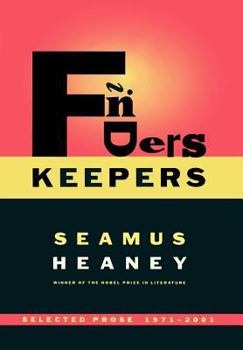Finders Keepers: Selected Prose 1971-2001
Select Format
Select Condition 
Book Overview
Whether autobiographical, topical, or specifically literary, these writings circle the central preoccupying questions of Seamus Heaney's career: "How should a poet properly live and write? What is his relationship to be to his own voice, his own place, his literary heritage and the contemporary world?" Along with a selection from the poet's three previous collections of prose ( Preoccupations, The Government of the Tongue , and The Redress of Poetry ), the present volume includes Heaney's finest lectures and a rich variety of pieces not previously collected in volume form, ranging from short newspaper articles to radio commentaries. In its soundings of a wide range of poets - Irish and British, American and Eastern European, predecessors and contemporaries - Finders Keepers is, as its title indicates, "an announcement of both excitement and possession."
Format:Hardcover
Language:English
ISBN:0374154961
ISBN13:9780374154967
Release Date:June 2002
Publisher:Farrar Straus Giroux
Length:432 Pages
Weight:1.75 lbs.
Dimensions:1.4" x 6.4" x 9.2"
Customer Reviews
1 rating
An Excellent Collection
Published by Thriftbooks.com User , 22 years ago
As a person of Irish descent, I am especially proud of Seamus Heaney's contribution to poetry and literature study. His voice is uniquely Northern Irish, but his understanding of that which makes language and literature deep spans the world--its ages and cultures. With a poet's vision, Heaney latches onto the resonance of words and images that explicate the human experience, in Icelandic sagas, Dante's verse, Milosz, or fellow Irish writers.Heaney's aim in this collection of prose writings (some have been previously published and some are lectures) is to "celebrate and take possession" of poetry's excitement and exuberance. Each piece is autobiographical, in that his approach is not strictly the performance of formal literary criticism, but is rather the creative sojourn a poet can take into the depths of his own craft, to call the poetic spirit home. As he says, his central preoccupations are: How should a poet properly live and write? What is his relationship to be to his own voice, his own place, his literary heritage and his contemporary world?Heaney's leading article is "Mossbawn," which describes the County Derry in the 1940's--as an 'omphalos' or navel which marks the center of the world--whereby one gets the sense that Heaney is a young Stephen Dedalus attempting to locate himself in Ireland, his community, and the world at large. His sentences are rich and carefully worded to evoke just the proper provincial image. He talks about his first forays in reading literature, rhymes, and the formidable Byron and Keats.The next piece, "from Feeling Into Words" talks about the craft of writing poetry--his "Digging"--lines from Wordsworth. The next articles in Section I are interesting and special--on T.S. Eliot, living in Belfast and No. Ireland, being an Irish student and writer who writes in an English language.Section two engages various interests: English writers and poets, Yeats, No. Irish poets and poetry, Kavanagh, P. Larkin, Dante and modern poetry, Z. Herbert, W.H. Auden, R. Lowell, S. Plath, Kinsella, E. Muir, Marlowe, John Clare, H. MacDiarmid, D. Thomas's "Do Not Go Gentle...," E. Bishop, and R. Burns.Section Three: S. Smith, Calvino's "Mr. Palomar" (an excellent book and review of it), Norman MacCaig, Ted Hughes, and C. Milosz (who writes marvelous verse).This is a superb collection. I also recommend Heaney's meditations on Frost. He always attempts to uncover--to 'dig into'--features in poetry that make it 'good,' and in so doing, he immerses himself in a loved craft and discipline, to create vibrant, poetic prose. One gets the feeling here that Heaney is showing-off his 'finders keepers' treasures--his favorites--his cherished agate marbles, which clink and rattle in a bag of sensuous word play.





